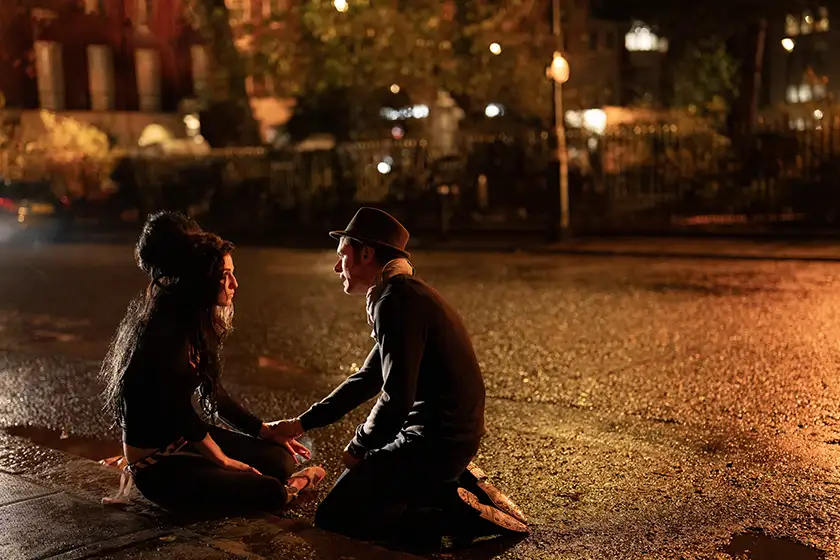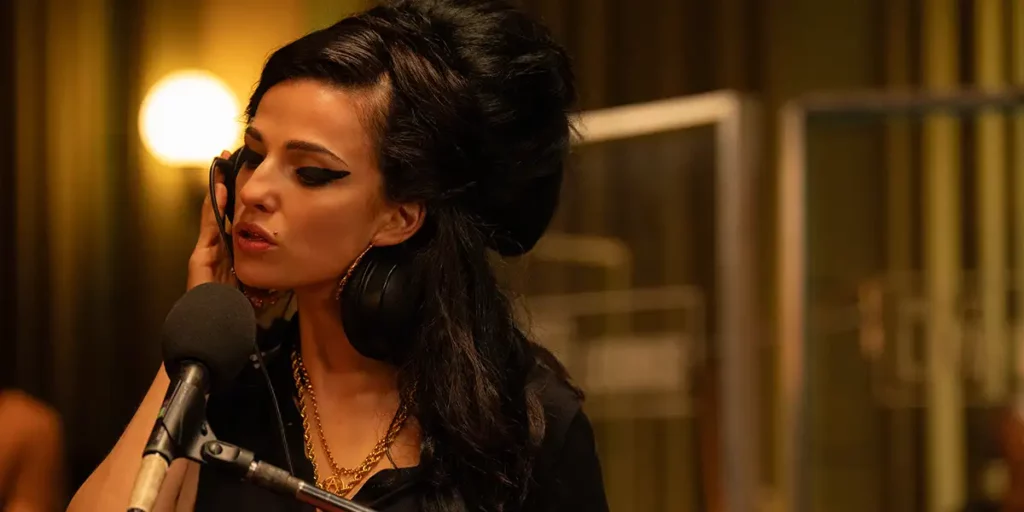Back to Black is an aimless biopic devoid of depth, adding nothing new to Amy Winehouse’s story, or her iconic career as a recording artist.
Director: Sam Taylor-Johnson
Genre: Biopic, Music, Drama
Run Time: 122′
US Release: April 12, 2024
UK Release: May 17, 2024
Watch Back to Black: in theaters
If you grew up in the UK in the early ’00s, you’ll know just how popular and inspirational Amy Winehouse was as a British vocalist during that period. She was recognized for having one of the most distinctive singing voices and wasn’t afraid to be herself, fostering a unique style and a refreshing, no-bullsh*t demeanor. Winehouse refused to be any record label’s puppet and confined artistically to a box.
In Sam Taylor-Johnson’s biopic Back to Black, we establish early on that Winehouse rejects artistic constraints as she tells a label executive, “I ain’t no Spice Girl.” Winehouse played by her own rules, and the singer’s musical inspiration from the 1960s, accompanied by her powerful voice, consistently mesmerized audiences, reflecting her undeniable talent whenever she performed on stage. Winehouse was a gift to the industry and was destined to be a star.
When it was announced that Taylor-Johnson would be releasing a biopic based on Winehouse’s life, I hoped the film would, at the very least, dedicate a vast amount of time to the star’s creative process and talent as a singer and songwriter. In addition, I wanted to see Back to Black capture Winehouse’s playful side and her witty sense of humor that we often saw during interviews, showcasing her cheeky personality and grounded nature. Yes, Winehouse had a very publicized romance with Blake Fielder-Civil, but she was also a human being with her own identity. During the mid- to late-’00s, you couldn’t pick up a newspaper or magazine in the UK without seeing photos of the couple plastered over the cover. The paparazzi hounded the pair day in and day out. It was sad to see their substance abuse and destructive relationship exploited and take center stage while Winehouse’s musical talent became overshadowed by press headlines.
There’s no doubt that Fielder-Civil (Jack O’Connell, of Ferrari) was a huge part of Winehouse’s time on this earth and the love of her life, but sadly, Back to Black takes the same paparazzi-type approach to the narrative, directing its attention to Winehouse and Fielder-Civil’s dysfunctional relationship and their substance abuse. What’s even worse is the fact that the feature fails to adequately reflect the impressive success and one-of-a-kind talent of Winehouse in terms of her musical career and her rise to stardom.

There are a handful of studio sessions and glimpses of the star with a pen and paper in hand as she writes some of her greatest hits, but they are fleeting, surface-level moments that are randomly strung together and cannot capture how truly special she was as an artist. Even significant moments in her career, which merit dedicated attention and should have been included in the narrative, are glossed over. Take, for example, the making of “Back to Black.” Winehouse collaborated with Mark Ronson, who produced six songs on her legendary second studio album. That said, he is barely shown in the film, which is an odd choice given that the pair became good friends and worked together frequently.
The same lackluster approach exists when portraying most of Winehouse’s relationships outside of her romance with Fielder-Civil. Taylor-Johnson skips over some of the most important people in Winehouse’s life, including her lifelong childhood friends Tyler James and Juliette Ashby, who have limited exposure in the film. This is perplexing given that they were such an important part of the late singer’s life, though they are never given the screen time to showcase how much their friendship meant to Winehouse and how close she was to the pair.
When portraying Winehouse’s relationship with her parents, their interactions are superficial and devoid of depth. I can recall only a few instances when Winehouse’s mother, Janice (Juliet Cowan), appears throughout the film, and we are never given any insight into their mother-daughter bond. Winehouse’s father, Mitch (Eddie Marsan, of The World’s End), is featured more frequently throughout the runtime, but their time spent together never feels genuine. Instead, we see Winehouse’s father drive her around in the back of his cab, and there are some other instances where Mitch is sitting in the crowd cheering his daughter on whenever she performs at a jazz club or bar. It’s all so forced, and it never appears credible. Why? Because Back to Black never takes the time to build emotional depth between Winehouse and her parents and instead resorts to casual interactions that never truly capture the intended emotional weight.
Back to Black was my first introduction to Marisa Abela, and I can’t praise her enough for giving this project her all. You can tell how dedicated she was to perfecting Winehouse’s talking and singing voice, and one can only imagine how daunting attempting to step into the shoes of a real-life icon must be. No one, and I mean absolutely no one, was going to be able to replicate Winehouse’s vocals through live performances. However, Abela can sing, and she does a fantastic job of resembling the late singer’s sound as best as she can. There’s no denying that Abela is a talented actress, though I never once felt like her performance captured Winehouse’s true personality.
In fact, if you watched Asif Kapadia’s outstanding 2015 documentary Amy, which featured many of Winehouse’s friends and family, or if you have viewed any interviews with those close to her, you quickly realize that Back to Black fails to convincingly portray the actors as their real-life counterparts. I want to stress that this has nothing to do with the cast’s performances. What this boils down to is a poorly written screenplay that swiftly moves through Winehouse’s career and never takes time to delve deeper into her identity as both an artist and an individual and provide a more profound insight into our subject and other meaningful relationships with those that surrounded her.
Instead, Back to Black spends almost all its runtime focused on Winehouse and Fielder-Civil’s destructive romance, as if it were the only thing to have existed in the late singer’s life. The film even skips over the fact that Fielder-Civil introduced her to heroin and presents Winehouse as the one solely responsible for her downfall. While acknowledging the toxic codependency between the pair and Winehouse’s struggles with drug and alcohol abuse are necessary and significant aspects of her life, attributing all the blame onto Winehouse is a disservice to her legacy. It’s also a strange approach, considering that Taylor-Johnson stated that this film was intended to honor Winehouse’s life respectfully.
Throughout Back to Black’s lengthy 2 hours and 2 minute runtime, the only element of the film that I found uplifting was the connection depicted between Winehouse and her grandmother Cynthia (Lesley Manville, of Mrs. Harris Goes to Paris), who introduced her granddaughter to jazz and greatly influenced her style. This being the feature’s only redeeming quality is disappointing given that Back to Black is based on one of Britain’s most influential musical artists, though Winehouse’s impressive career and fun-loving spirit are never captured in the film. Simply put, the soulful, spicy singer that we all grew to love deserved a more favorable depiction of her astounding life than the one that exists here.
Back to Black is now available to watch in cinemas in the UK & Europe and will be released in US theaters on May 17, 2024.

